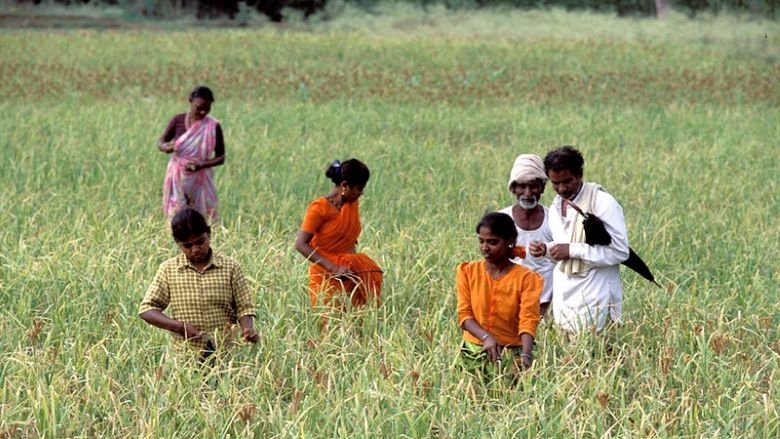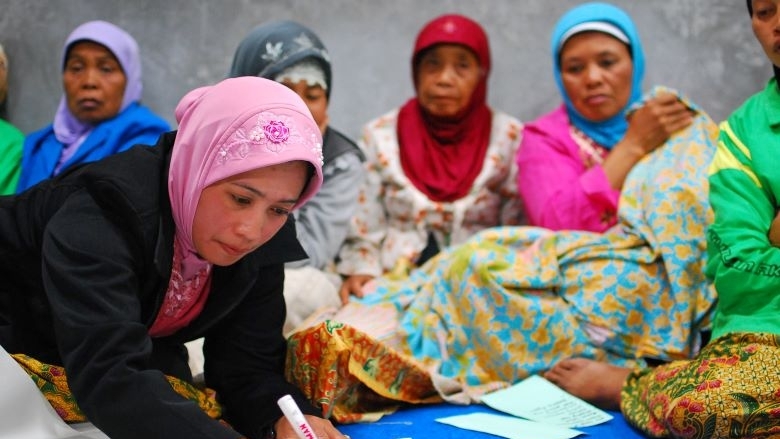Welcome to Research Insights, a knowledge space dedicated to collecting, condensing, and communicating policy-relevant findings from our team's research. Each edition offers concise and accessible summaries of the most impactful studies, ensuring that policymakers, practitioners, and stakeholders stay informed about the latest developments and evidence in the field. Our goal is to bridge the gap between complex research and practical application, fostering informed decision-making and effective policy design.
Check our latest edition below. You can also access previous editions here.
November 2025: Rethinking Resilience: Adapting to a Changing Climate
Resilience is not just desirable but essential for low- and middle-income countries that bear the brunt of a changing climate.
Our latest Policy Research Report “Rethinking Resilience” takes center stage in this edition, outlining a shift from reactive relief to proactive adaptation through the Five I’s: income, information, insurance, infrastructure, and interventions. This layered strategy offers countries a blueprint to anticipate shocks, reduce vulnerability, and lay the foundation for inclusive, sustainable growth.
Complementing this vision, new research provides compelling evidence on the urgent need to build resilience, as well as targeted reforms that illustrate aspects of the Five I’s approach. Data from 160,000 firms in 134 countries reveal how rising temperatures affect productivity and revenues—particularly for small and medium enterprises—and points to reforms that can help businesses adapt. In Africa, regenerative agriculture emerges as a “triple win” for productivity, resilience, and climate adaptation, highlighting the role for innovative finance and strong local institutions. Finally, high-resolution data from South Asia uncovers sharp disparities in exposure to heat and floods, underscoring the importance of granular information in guiding targeted policies and interventions to reach the most vulnerable households and firms.
Bonus: Would you like to know more about the Rethinking Resilience report? Join our next Policy Research Talk on December 2!
💡 Research Highlights:
| Rethinking Resilience: Adapting to a Changing Climate Forhad Shilpi (Development Research Group), Matthew E. Kahn (University of Southern California), Claudia Berg (World Development Report), and the Policy Research Report team | |
| Climate change has made resilience a development imperative, especially for low- and middle-income countries, which bear a disproportionate burden from disasters and take far longer to recover from their impacts. The main challenge is to move beyond approaches that focus on coping with the aftermath of disasters, and instead empower individuals, firms, and markets to anticipate, prepare for, and reduce the severity of shocks before they occur. Building resilience requires a layered strategy: rapid income growth to reduce vulnerability; reliable, accessible information to turn uncertainty into actionable risk; robust insurance and financial inclusion to spread losses and speed recovery; resilient infrastructure to protect livelihoods and connect markets; and targeted interventions to support the most vulnerable. By prioritizing these “Five I’s”, countries can move from reactive relief to proactive adaptation, laying the foundation for inclusive growth and long-term prosperity. Read more> |
| Business Under Heat: Evidence from 134 Nations on Climate Adaptation Claudia Berg (World Development Report), Luca Bettarelli (University of Palermo), Davide Furceri (International Monetary Fund), Michael Ganslmeier (University of Exeter), Arti Grover (International Finance Corporation), Megan Lang (Development Research Group), Marc Schiffbauer (Finance, Competitiveness and Investment) | |
 | Rising temperatures are undermining firm performance across the globe, but the impact is most severe for small and medium-sized enterprises in low- and middle-income countries. Analyzing microdata from nearly 160,000 firms in 134 countries, this study finds that a 0.5°C increase in annual temperatures reduces revenues by 12%, mainly through lower labor productivity and wages. Vulnerability is highest among younger firms, those in heat-sensitive sectors, and those facing limited access to finance, burdensome regulations, or unsafe conditions. Targeted reforms—improving access to finance, streamlining regulations, strengthening public goods, and supporting innovation—can help firms “weather the storm” and build resilience for inclusive growth. Read more> |
| Can Regenerative Agriculture Deliver for Africa? Andrew Dabalen (Africa Chief Economist Office), Aparajita Goyal (Africa Chief Economist Office), and Ruozi Song (Development Research Group) | |
 | Regenerative agriculture—farming that restores soil and ecosystem health—has gained global attention as a potential “triple win” for productivity, resilience, and climate adaptation. Yet, in Africa, where smallholder farmers face high costs, credit constraints, and limited local support, large-scale adoption remains difficult. Payments for ecosystem services and emerging carbon markets could help offset initial losses and create new income streams for farmers, while incentivizing climate-friendly practices. Strengthening local institutions and tailoring interventions to local conditions will be key to realizing regenerative agriculture’s promise in the region. As empirical evidence continues to emerge, understanding the trade-offs between short-term costs and long-term benefits will be crucial for effective policy design. Read more> |
| Heat and Flood Exposure: Who Bears the Burden in South Asia? Patrick Behrer (Development Research Group), Jonah Rexer (South Asia Chief Economist Office), Siddharth Sharma (South Asia Chief Economist Office), Margaret Triyana (South Asia Chief Economist Office) | |
 | Using newly available, highly granular spatial data, this study examines how households and firms in South Asia are exposed to extreme heat and floods. Unlike previous research limited to broad administrative units, the analysis pinpoints disparities at the neighborhood level: poorer households in both urban and rural areas are more exposed to extreme heat. Smaller firms—key employers of the poor—are also more exposed to climate hazards than larger firms, especially in urban areas. However, the relationship between wealth and flooding exposure is more complex: rural households with higher wealth face greater flood exposure, as fertile agricultural lands are often located in flood-prone areas. These findings underscore the importance of leveraging granular data to identify vulnerabilities and design targeted, pro-poor climate resilient policies. Read more> |
📰 News & Calls for Papers:
Submission Deadline: December 8, 2025. Submit your paper for the 10th Urbanization and Development Conference, which will take place in Washington, DC on March 30-31, 2026.
Submission Deadline: January 11, 2026. Submit your paper for the second edition of the International Seminar on Trade (ISoT), which will take place in Geneva, Switzerland on May 21-22, 2026.
📅 Past & Upcoming Events:
December 2: Join Forhad Shilpi, World Bank Senior Economist and lead author of the report “Rethinking Resilience: Adapting to a Changing Climate” for the next Policy Research Talk at 12:30 pm ET. where she’ll dive into the report key insights.
(Past event) November 18: Did you miss the session “Policy for the People” by Vijayendra (Biju) Rao? Access the recording and presentation of the event here.








































